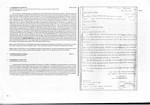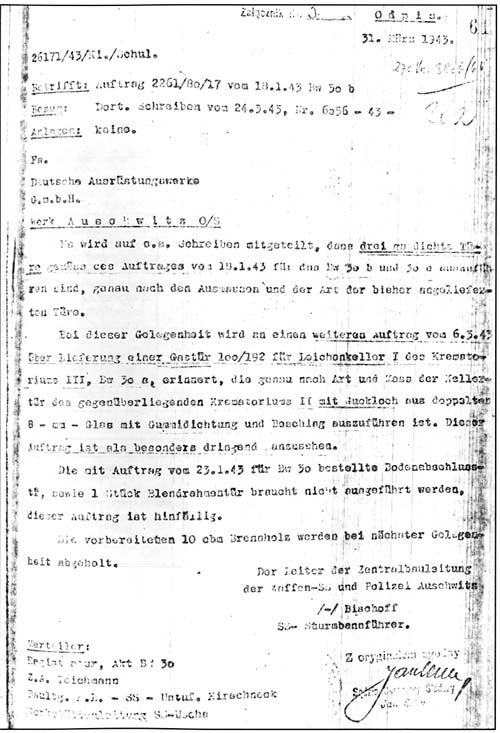|
|
 |
 |
AUSCHWITZ:
Technique
and Operation
of
the Gas Chambers © | |
|
| |
 |
Back |
 |
Contents |
Page 436 |
 |
Home
Page |
Forward |
 |
| |
| 7. |
“1 Gasdichtetür / 1 gas-tight
door”
[File BW 30/43, page 34, verso of the Krematorium II
handover document dated 3lst March 1943, the recto being BW 30/43,
page 9] |
[Photos 9 and 10]
|
| |
|
|
| |
This document,
considered promising. was thought to prove the material reality of
homicidal gas chambers. Officially revealed for the first time in
the afternoon of 30th June 1980 at the Ecole des Hautes Etudes en
Sciences Sociales during the Colloquium on “NAZI GERMANY AND THE
JEWISH GENOCIDE” held at the Sorbonne. it was one of the high points
if not the high point of the paper, announced as most important, on
“Die Gaskammern / the gas chambers” by Professor Dr Wolfgang
SCHEFFLER of West Berlin. After recalling the main "abnormal"
functions of Krematorien II and III, followed by mention of the
possible preheating of Leichenkeller I (cf the letter of 6/3/43,
file BW 30/25, page 7. [Part II, chapter 6,]), a sign of its use as
its gas chamber since a temperature of 26°C is necessary for the
hydrocyanic acid to evaporate, Schleffler cited a description of the
building on its official handover, mentioning “1 gas-tight door”.
The Colloquium was shown only an extract of five lines (lines 4 to 8
on Photo 10), without mention of the source, or presentation
of a reproduction of the original document. Questioned on its
origin. he said that he had obtained it in Moscow. Later on, he told
me that it could not be communicated as it could not be either
photographed or photocopied, which is difficult to believe. This
unknown extract, presented totally without context, brought nothing
new or “definitive”, other than confirmation that the entrance to
one of the Leichenkeller 1 was fitted with a gas-tight door, which
was already explicitly stated in the letter of 31st March 1943
[Photo 8]. The traditional nature, not to say the mediocrity,
of his paper was such that it was not reproduced in the published
proceedings of the Colloquium and was replaced by one by Uwe
Dietrich ADAM (University of Tübingen), a recognized specialist in
the “gassing trucks”, rather than the problems raised by the gas
chambers proper. The fact is that this document came from the
“OCTOBER REVOLUTION” Central State Archives in Moscow.
Transmitted to the Warsaw Central Commission, then sent to Vienna,
where it was produced at the beginning of 1972, with others of the
same type, at the trial of the “crematorium architects” former SS
officers Walter Dejaco and Fritz Ertl, it formally indicates that
the entrance door to Leichenkeller 1 of KREMATORIUM II was
gas-tight. It forms part of a series of “criminal traces”
demonstrating that certain rooms in Krematorien II, III, IV and V
were made gas-tight. It would appear that W Scheffler had a copy of
only about 8 pages concerning the acceptance of the Birkenau
Krematorien. The total would he greater than this.
Photo 9 is page 9 of BW 30/43, recto of the
handover document for Krematorium II, stating that the building was
constructed in a workman like manner. using both prisoners and
outside civilians. Only the main firms involved are mentioned.
though there were others.
Photo 10 is page 34 of
BW 30/43, verso of the handover document for Krematorium II. The
only real significance of this document is that, while it may have
been possible to quibble about the meaning of “Gastür”, this is no
longer the case with “Gasdichtetür”. |
| |
|
| 8. |
4
Drahtnetzeinschiebvorrichtung /
4 wire mesh introduction
devices |
[Photo 11] |
| |
|
|
| 9. |
4 Holzblenden / 4 wooden
covers
[File BW 30/43, page 12 for both] |
|
| |
|
|
| |
Inventory annexed to
the Krematorium II handover document of 31st March 1943 [Photo
9] concerning the basement. The clerk who filled in the form
made a mistake, putting some of the entries on the wrong lines: the
“4 wire mesh introduction devices” and the “4 wooden covers” were
installed in Leichenkeller 1 of Krematorium II, not in Leichenkeller
2 as indicated (for the demonstration of this inversion see the end
of “One proof, one single proof”). The four devices and their covers
were used to introduce Zyklon-B into Leichenkeller 1 / the gas
chamber of Krematorium II. According to the American aerial
photograph of 24th August 1944, the four introduction points were
located along a line running the length of the room in the EASTERN
half. In the present ruins, two of these openings are still visible
at the southern end but in the WESTERN half. Nobody up to now seems
to have been concerned by this contradiction, nor to have explained
it. This document is important evidence of the use of Leichenkeller
1 of Krematorium II as a homicidal gas chamber |
|
 |
Photo 8
| |
| |
AUSCHWITZ:
Technique
and operation
of the gas chambers
Jean-Claude Pressac
© 1989, The
Beate Klarsfeld Foundation |
 |
Back |
Page 436 |
Forward |
 |
|

